|
|
|
Sort Order |
|
|
|
Items / Page
|
|
|
|
|
|
|
| Srl | Item |
| 1 |
ID:
083847
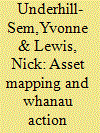

|
|
|
|
|
| Publication |
2008.
|
| Summary/Abstract |
Te Runanga o Te Rarawa is the tribal council representing the interests of the marae (tribal commons) and hapu (a subtribal kin group) that make up the iwi (a Maori tribe) of Te Rarawa in the far north of Aotearoa/New Zealand. In April 2005, officials approached us to help them secure a valuable funding stream tagged to marshalling resources for material development in the area. They sought curriculum vitae and assistance in reframing the funding specifications. Intrigued, armed with a conceptual toolkit drawn from Gibson-Graham's ideas of post-development and asset-based community mapping, and confident that we could add value, we agreed to help. This paper examines the complex politics of our involvement and our changing positioning as researcher subjects. We argue that negotiating a politics of knowledge for projects of this nature requires engagement in complex representational politics of place and divisive identity politics that rage around it. There are no easy protocols for outside researchers, but with appropriate humility and sensitivity to these politics, we can rely on, and should stand up for, the value of our work, which lies in commitments to excellence in scholarship. We cannot and should not seek to control these politics, which will chew us up and spit us out - humanely and with good grace or otherwise. However, good academic work will recognise and adapt to them. In our particular case, we argue that our work had significant value; and in this paper, we trace the production of this value
|
|
|
|
|
|
|
|
|
|
|
|
|
|
|
|
| 2 |
ID:
095594
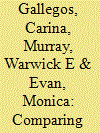

|
|
|
|
|
| Publication |
2010.
|
| Summary/Abstract |
This article provides a comparative investigation of education programmes intended to revitalise te reo (the language of the M?ori, indigenous to Aotearoa New Zealand) and Mapudungun (the language of the Mapuche, indigenous to Chile), respectively. The historical processes of colonisation and globalisation in Chile and Aotearoa New Zealand that have threatened indigenous language are outlined, and revitalisation efforts subsequently described and assessed. Finally, the disparities in success that the two countries have experienced in their revitalisation efforts are examined, and some recommendations made.
|
|
|
|
|
|
|
|
|
|
|
|
|
|
|
|
| 3 |
ID:
090016
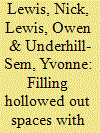

|
|
|
|
|
| Publication |
2009.
|
| Summary/Abstract |
The contracting out to private providers of services previously delivered within the state has been framed critically as 'hollowing out' and read for its erosion of social democracy, social justice and welfare, as well as its inefficiencies in practice. It is commonly dismissed as neoliberalism. In this paper, we highlight the gains made through this new contractualism by Te Oranga, the Family, Health and Education division of Te Runanga o Te Rarawa located in the Far North of New Zealand. Our aim is not to narrate the exceptional, but to point to the inherent resistances to totalising projects residing in agency and place. Placed at the service of a deep sense of community being and community good rather than self-interest, delivery contracts have enabled Te Oranga to pursue an alternative form of local development and craft a set of progressive spaces. Although highly contingent upon powerful Maori political projects, we argue that the case suggests that gains may be sought in other settings, albeit partial, temporary, and politically contingent. We thus offer a more nuanced account of neoliberalism by highlighting its agency, fractures, politics, and contradictions, and by demonstrating that actualised neoliberalisms are co-constituted with other political projects.
|
|
|
|
|
|
|
|
|
|
|
|
|
|
|
|
| 4 |
ID:
129839
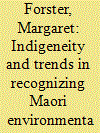

|
|
|
|
|
| Publication |
2014.
|
| Summary/Abstract |
Valuing indigeneity is a recent phenomenon despite a long tradition in Aotearoa New Zealand of mechanisms that recognize Maori rights and interests. Political pressure to acknowledge indigeneity has been a prerequisite to greater recognition of Maori rights and interests in environmental policy. Maori involvement is now a feature of the state resource management system; however, more substantive forms of power-sharing is sought to secure tribal authority, to reaffirm Maori culture, and to ensure that land continues to shape the identity of Maori people.
|
|
|
|
|
|
|
|
|
|
|
|
|
|
|
|
| 5 |
ID:
082036


|
|
|
|
|
| Publication |
2008.
|
| Summary/Abstract |
Multiculturalism has been offered as an answer to the civil
rights claims of a wide variety of ethnic and national minorities
within liberal democratic settler-states. This article adds to
the critiques of the appropriateness of multiculturalism in
answering the self-determination claims of indigenous populations
by investigating biculturalism in Aotearoa/New Zealand.
Indigenous groups continue to demand greater recognition
not only of sui generis claims to land and resources but
also to the acceptance of indigenous philosophies and perspectives
in the management of land and resources. As indigenous
populations have been forced toward the edge of the
state, they have been forced to reassert their cultural values in
order to fundamentally reinvent the relationship between colonizer
and colonized. This "reinvention" of society, coming
from the edges, propelled by indigeneity, is beginning to challenge
the construction of the white settler-state. These challenges
occur in places, not within arbitrary, theoretical space.
They also vary in scale, from the single individual acting on
behalf of her community to vast land claims by indigenous
peoples. This article discusses how the exercise of indigenous
self-determination, observed in specific places, is beginning to
transform Aotearoa/New Zealand society into a bicultural and
binational partnership, altering the meaning of citizenship for
both Ma¯ori and whites.
|
|
|
|
|
|
|
|
|
|
|
|
|
|
|
|
| 6 |
ID:
112396
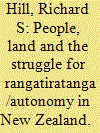

|
|
|
|
|
| Publication |
2012.
|
| Summary/Abstract |
This article interrogates indigeneity in the context of two New Zealand indigenous discourses, one of them land orientated and the other people orientated. It argues that the former has generally been emphasized over and above the latter, which it examines principally in terms of the struggle for the rangatiratanga (loosely translatable as autonomy) promised to Maori by the British Crown in the Treaty of Waitangi of 1840. People-based discourse is seen as key to the resilience of Maoridom and its powerful assertions of agency in recent decades. But to argue in this way is not to discount the land discourse, which in the holistic Maori worldview is conflated with the people discourse and rangatiratanga
|
|
|
|
|
|
|
|
|
|
|
|
|
|
|
|
| 7 |
ID:
090012


|
|
|
|
|
| Publication |
2009.
|
| Summary/Abstract |
In this article, we will argue that any investigation of the 'progressive spaces of neoliberalism' needs to maintain a critical stance on the neoliberal project. In particular, we suggest that it is important to see the ways 'progressive spaces of neoliberalism' are troubled by discourses of colonisation which in turn are themselves disrupted by genealogies of Indigenous struggles. Spaces of neoliberalism are embedded in discourses of colonisation, as space is ultimately grounded in somewhere, in a 'place'. In Aotearoa, the discourses of colonisation and place are in turn entangled with a genealogy of Maori struggles to maintain and create political, economic and social structures and frameworks. These struggles are also productive, and have the potential to encourage, diverse political economies of production, trade and enterprise distinct from neoliberalism, its progressive spaces, and colonisation. We will investigate two cases to highlight that the 'messy actualities' of neoliberalism cannot be extracted from the genealogy of colonisation. Any attempts to start an analysis of progressive space as located in a neutral 'now and here' are therefore problematic.
|
|
|
|
|
|
|
|
|
|
|
|
|
|
|
|
|
|
|
|
|